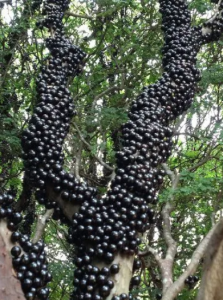In Brazil, it is accepted that jabuticaba is used as a gargle for chronic tonsil inflammation caused by a caustic decoction of sun-dry skins. It is also used to treat hemoptysis, asthma, diarrhea, and dysentery.
Such fruit usage may also result in overconsumption of tannin.
The fruit of Jaboticaba contains compounds that are similar to those that have been shown to have advantageous biological effects in cranberries, grapes, and other related species, including anti-ageing, anti-inflammatory, and antioxidant qualities.

1. Jabuticaba Fruit can be stimulating, opens up bronchial airways, which is good for asthma, and slightly astringent making it great for diarrhea, and also healing those suffering from tonsillitis.
2. Jabuticaba Fruit is anti-inflammatory, and full of great antioxidants.
The jabuticaba fruit, which is native to Brazil, has an unusual characteristic related to how it develops. You can clearly see that they sprout right from the tree’s trunk and branches in the picture above.
Similar to grapes, they are frequently consumed raw, but they can also be transformed into juice, jellies, jams, wine, and liqueurs.






